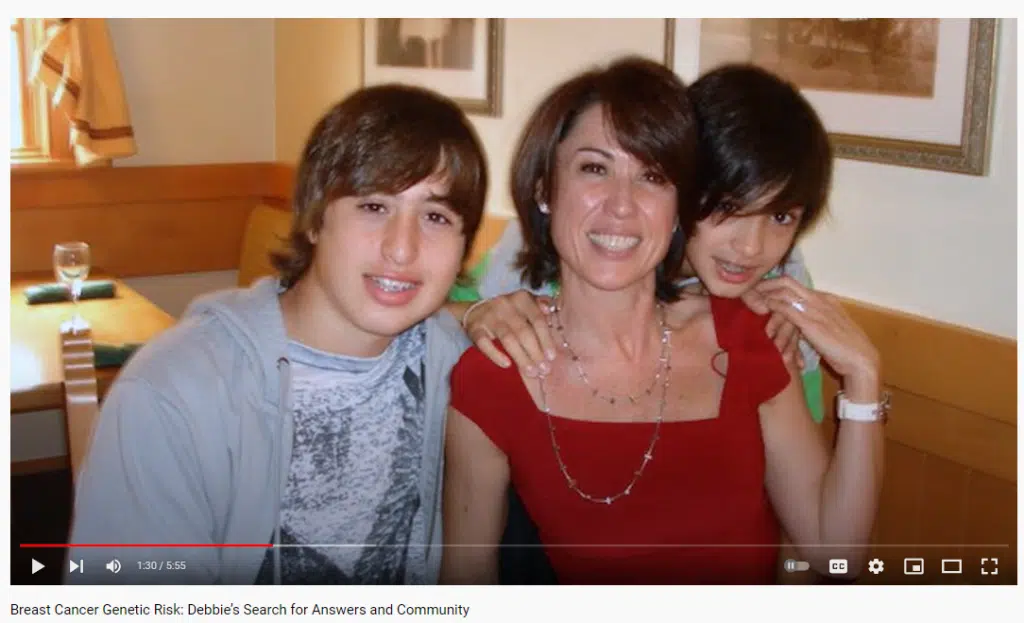by: Jennifer Bringle, contributing writer for BreastCancer.org
Note: This blog was originally published on the website of Breastcancer.org. FORCE is grateful to our partners at Breastcancer.org for capturing Debbie’s powerful story in this video.
When Debbie Denardi was diagnosed with triple-negative breast cancer in 2010, she knew her DNA had probably played a role in her diagnosis. As a child in Buenos Aires, Argentina, Debbie had lost her mother to breast cancer, along with three of her aunts.
Debbie’s oncologist referred her to a genetic counselor after reviewing her family history. The genetic counselor diagnosed Debbie with a BRCA gene mutation that increased her lifetime risk of breast cancer by 72%.
“For me, knowledge is power,” Debbie says. “I was excited to know they’d found a reason for my cancer. At the beginning, I was really scared, but at the same time this would tell me what to do.”
Having lost her mother when she was 13 years old, the most important thing for Debbie was to be there for her sons, who were teenagers when she was diagnosed.
“My kids were 13 and 14 back then, and I thought, ‘This story cannot happen again — I’m going to do everything in my power just to be here for them and to create the memories I didn’t get to create with my mother,’” she says. “I needed to fight this and really be strong because I needed to be here for them.”
Debbie’s doctor advised her to get a double mastectomy to treat the breast cancer and reduce her risk of recurrence. This recommendation brought back memories of her childhood, when she watched her mother go through the same procedure.
“I went back to the images of my mom when she had a double mastectomy back then in the ’70s,” she says. “There was no reconstruction, so it was difficult to see all the scars she had. So I thought, ‘Is that going to be me, or is it going to be different now?’”
While Debbie opted for reconstruction, the recovery process still proved challenging, both physically and emotionally.
“After my double mastectomy, it took a long time for me to process how I looked,” she says. “My mobility and flexibility, being able to lift my arms again — I like to exercise and use my arms. I wanted to regain that.”
Debbie began attending support group meetings to help her work through the physical and emotional effect of breast cancer and its treatment, and her BRCA-positive diagnosis. In those sessions, she felt herself grow stronger, and she found a new purpose in life.
“Little by little, everything started changing,” she says. “And I really felt the need to listen to a person, cry with that person, see what they were going through in their process. It changed me dramatically because I wanted to be that person — I wanted to be there for other patients.”
Debbie began volunteering for FORCE, an advocacy group for those living with hereditary breast, colorectal, endometrial, ovarian, pancreatic and prostate cancers. She began attending conferences, sharing her story with others, and advocating for patients and survivors of hereditary cancers.
“It felt good,” she says. “And it helped me through my healing also, just to be able to tell my story.”
Debbie’s work through FORCE has not only helped her to heal from her own cancer experience, but also allowed her to share the lessons she’s learned with others going through similar situations. And it has become her mission to reach as many hereditary cancer patients and survivors who need the same kind of support and advocacy she needed after her diagnosis.
“We can do so much for our community,” she says. “My next project is to recruit more cancer survivors that can do the same thing that I’m doing. It’s so important to get more Latinas involved in advocacy, because in that way we will be able to make real changes for our community.”
More than a decade after her diagnosis, Debbie is hopeful for the future and grateful to have the time her mother and aunts didn’t get.
“My mom didn’t have the chance of surviving,” she says. “Now we have a chance of surviving and hopefully in the future, my vision is one day we will be able to have a cure for most types of cancer.”
